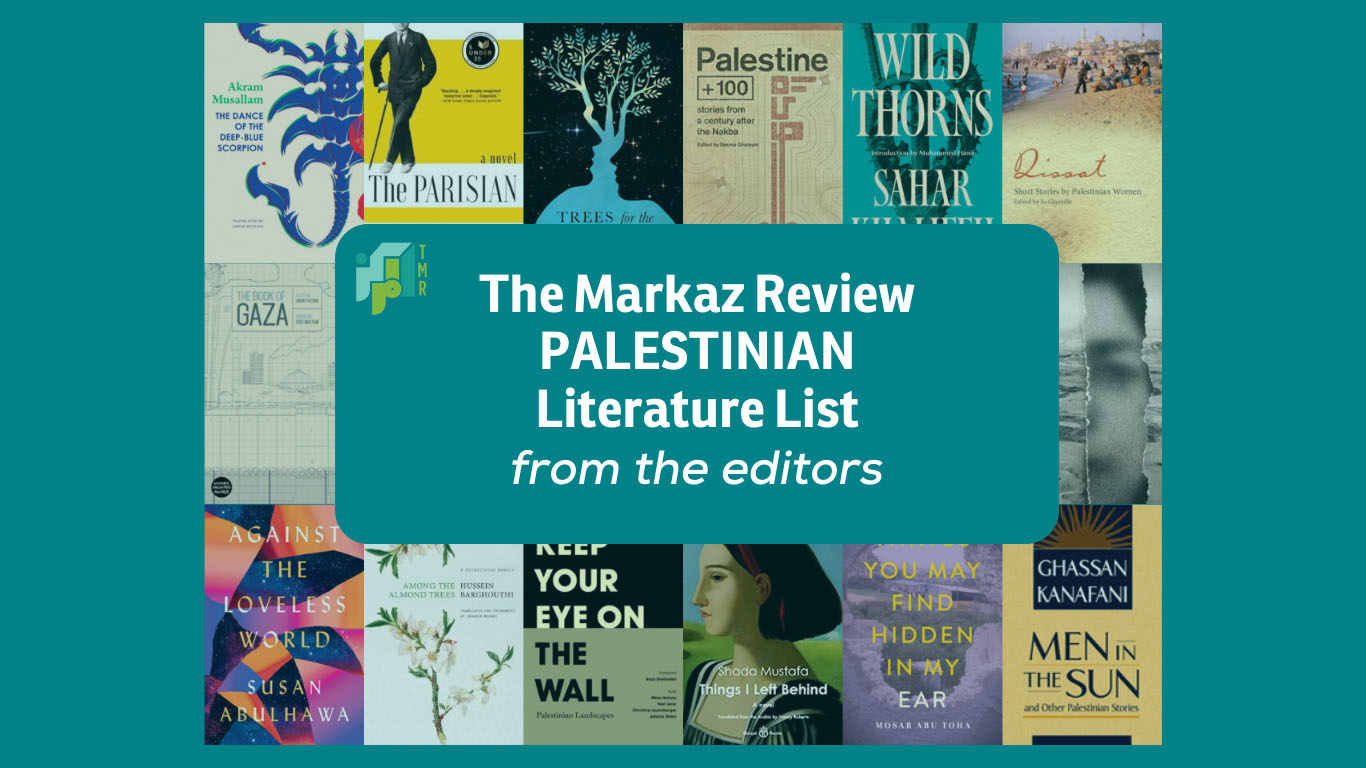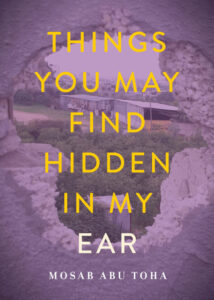The editors welcome your suggestions as we grow this list over time, which you can post in the comments below.
Ammiel Alcalay
Things You May Find in My Ear (2022), the debut poetry collection of Gazan Mosab Abu Toha, who continues to shelter under the bombs with his family in what is the fourth major attack on the Gaza Strip in his lifetime, and the most brutal. This book has been the recipient of several prizes, most recently the 2023 Derek Walcott Poetry Prize.
Rana Asfour
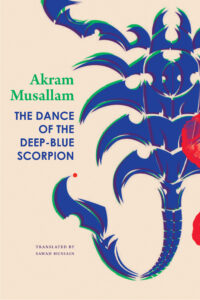 The Dance of the Deep Blue Scorpion by Akram Musallam, trans. by Sawad Hussain (2021)
The Dance of the Deep Blue Scorpion by Akram Musallam, trans. by Sawad Hussain (2021)
An experimental novel that explores Palestinian identity through Akram Musallam’s extended metaphors and dark humor in the hope of transcending the loss of territory and erasure of history.
Wondrous Journeys in Strange Lands by Sonia Nimr, trans. by Marcia Lynx Qualey & Sawad Hussain (2020)
Sonia Nimr’s award-winning novel is a richly imagined feminist-fable-plus-historical-novel that tells an episodic travel narrative, like that of the great 14th century Moroccan traveler Ibn Battuta, through the eyes of a clever and irrepressible young Palestinian woman.
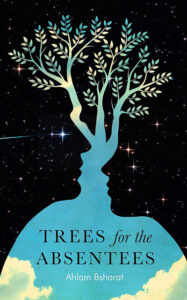 Trees for the Absentees by Ahlam Bsharat (2019)
Trees for the Absentees by Ahlam Bsharat (2019)
Young love, meddling relatives, heart-to-hearts with friends real and imagined — Philistia’s world is that of an ordinary university student, except that in occupied Palestine, and when your father is in indefinite detention, nothing is straightforward.
The Drone Eats With Me: A Gaza Diary by Atef Abu Saif (2016)
Atef’s eye-witness diary pieces were published in a range of major outlets (the Guardian, the New York Times, Slate, and the Sunday Times, etc) and became a unique porthole into the conflict for Western readers. Here, his complete diaries of the war, offer a unique perspective on one of the world’s most contested political crises.
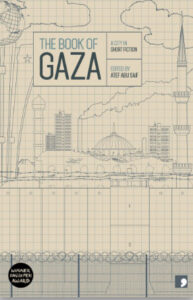 The Book of Gaza: a city in short fiction (2014)
The Book of Gaza: a city in short fiction (2014)
An anthology that brings together some of the pioneers of the Gazan short story from the ‘70s and ‘80s, as well as younger exponents of the form, with ten stories that offer glimpses of life in the Strip that go beyond the global media headlines; stories of anxiety, oppression, and violence, but also of resilience and hope, of what it means to be a Palestinian.
Jordan Elgrably
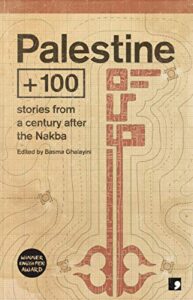 Palestine +100: Stories From a Century After the Nakba edited by Basma Ghayalini (2019)
Palestine +100: Stories From a Century After the Nakba edited by Basma Ghayalini (2019)
The Palestinian-British editor of this futurist collection asked 12 writers to imagine the world a hundred years from the 1948 Nabka or catastrophe that befell the Palestinian people. As of 2023, we still don’t know what the future portends, but the present moment continues to serve up more of the same oppression from Palestine’s overlords.
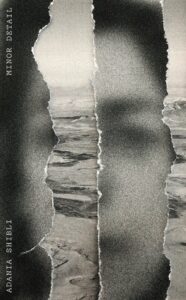 Minor Detail, a novel by Adania Shibli (2020)
Minor Detail, a novel by Adania Shibli (2020)
Kuwaiti novelist Layla AlAmmar published a laudatory review of the English translation of Shibli’s novel, in The Markaz Review, in 2020, and even three years later, this slim volume continues to stack up accolades and awards, justly deserved.
Out of It, a novel by Selma Dabbagh (2011)
In British-Palestinian Selma Dabbagh’s debut novel, Gaza is being bombed. Sound familiar? This is an insightful and powerful evocation of the contemporary Palestinian experience.
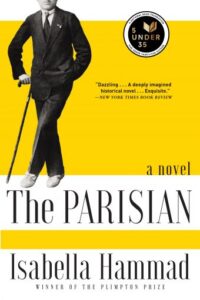 The Parisian, a novel by Isabella Hamad (2019)
The Parisian, a novel by Isabella Hamad (2019)
The young British-Palestinian’s debut novel provides a panoramic account of Palestinian lives across much of the 20th century, with stints in Montpellier, Paris and Palestine.
The Beauty of Your Face, a novel by Sahar Mustafa (2019)
Recounts an American story of Palestinian immigrants in the Chicago suburbs, and made the New York Times list of 100 Notable Books for 2020.
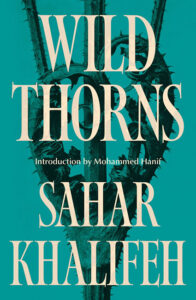 Wild Thorns, a novel by Sahar Khalifeh (2023 new translation)
Wild Thorns, a novel by Sahar Khalifeh (2023 new translation)
This is a classic novel and the first to unfurl the Palestinian experience in the West Bank under Israeli occupation, in which a young Palestinian named Usama returns to his homeland after several years working in the Gulf. Now an operative in the resistance movement, his mission is to blow up buses transporting Palestinian workers into Israel.
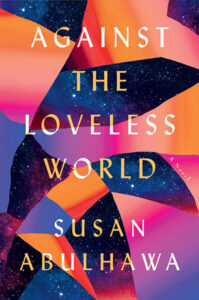 Against the Loveless World, a novel by Susan Abulhawa
Against the Loveless World, a novel by Susan Abulhawa
A story of revolution and immigration, Against the Loveless World was the subject of an extensive essay in The Markaz Review. Abulhawa is the accomplished author of Mornings in Jenin; this novel won the Arab American Book Award for 2021.
Malu Halasa
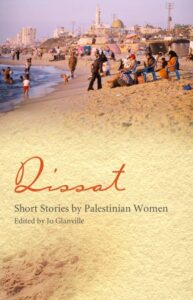 Qissat: Short Stories by Palestinian Women, edited by Jo Glanville (2006)
Qissat: Short Stories by Palestinian Women, edited by Jo Glanville (2006)
An important anthology of cross generational women’s voices from Palestine and the diaspora, compiled and edited by a leading British writer and broadcaster on antisemitism and human rights.
A Mountainous Journey: A Poet’s Autobiography by Fadwa Tuqan (1917–2003) trans. by Salma Khadra Jayyusi (1990)
The traumatic memoir of Palestine’s leading poet, whose writings embodied both resistance to the occupation and destructive patriarchal values closer to home.
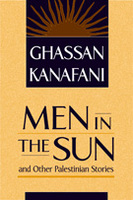 Men in the Sun and Other Short Stories by Ghassan Kanafani (1936-1972), trans. by Hilary Kilpatrick (1998)
Men in the Sun and Other Short Stories by Ghassan Kanafani (1936-1972), trans. by Hilary Kilpatrick (1998)
“Men in the Sun” is considered a classic in Palestinian literature. Also in this collection is “Letter from Gaza,” which Hisham Matar has written about during the 2009, 23-day Israeli bombardment of Gaza. Kanafani was assassinated by the Israelis in 1972.
Where the Line Is Drawn: A Tale of Crossings, Friendships, and Fifty Years of Occupation in Israel-Palestine, by Raja Shehadeh (2018)
The author and the Canadian-born Israeli Henry Abramovitch met as young men. A memoir of friendship, the book reveals the pressures of occupation on a relationship across the divide.
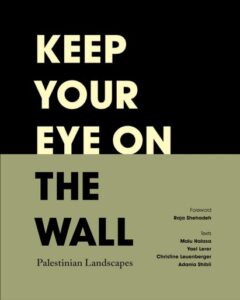 Keep Your Eye on the Wall: Palestinian Landscapes, edited by Olivia Snaije & Mitch Albert (2013)
Keep Your Eye on the Wall: Palestinian Landscapes, edited by Olivia Snaije & Mitch Albert (2013)
Words alone cannot convey the sheer oppressiveness of Israel’s separation wall. In this concertina book, seven award-winning artist-photographers respond to the wall in Palestine. Alongside a foreword by Raja Shehadeh, the essays include mine about the aestheticization of the wall later reprinted in the Markaz Review as Beautiful Ugly.
Mohammad Rabie
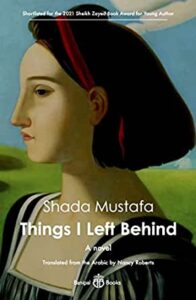 Things I Left Behind by Shada Mustafa
Things I Left Behind by Shada Mustafa
In her debut novel in short narrative passages, Shada Mustafa recounts a relationship between a Palestinian girl and her father, mother, and brothers in Palestine, and her lover and friends outside it, and her life full of travel between Palestine, Lebanon, Sweden, and the Philippines. The main character and the writer are similar in many details. They share an identity, study, and their love of writing.
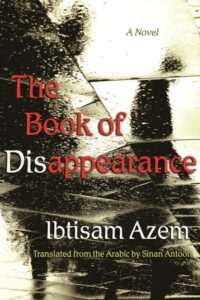 The Book of Disappearance by Ibtisam Azem
The Book of Disappearance by Ibtisam Azem
This is a critically acclaimed Arabic novel that invites English readers into the complex lives of Palestinians living in Israel. Here, the wish of the Israeli occupier comes true, as the occupier wakes up one day to find that all the Palestinians on the land of Palestine have disappeared, and with them any sign of their existence. Ibtisam Azem tells the story of how the Palestinians of the interior coexist with everything that surrounds them — the occupier, the stolen land, and its memory before the occupation, a memory that the Palestinian mostly inherits from his family. It also describes the Israeli, his apparent violence, the fear and anxiety that he suppresses inside, and his constant willingness to steal or plunder what others own.
Mother of Strangers by Suad Amiry
Set in Jaffa in between 1947 and 1951, this is a love story told like a historical account on a true story during the beginning of the destruction of Palestine and displacement of its people. The two lovers meet and then separate without their love story being completed. It describes Jaffa and its villages, and the differences between the lives of villagers and city dwellers in Palestine; but everything changes with the Nakba. In the final chapters, the author meets the two main characters, Subhi and Shams, and each tells the story from his or her point of view (both of whom have reached seventy years of age). A novel suited for our time.
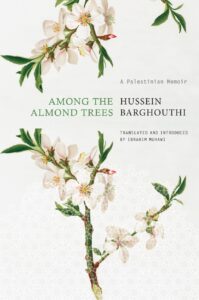 Among the Almond Trees by Hussein Barghouthi
Among the Almond Trees by Hussein Barghouthi
A poetically written and bitterly sweet memoir about nature, death, life in Palestine, and the universal concept of home. After his book The Blue Light, Hussein Barghouthi (1954-2002) continues here his biography. After he comes to terms with the fact that he has cancer, he begins to reminisce about his homeland, the almond gardens, his mother, his wife, and most importantly, his four-year-old child. A sentence from his memoir is found on Hussein Barghouthi’s grave: “If you visit me, I will be among the almonds.”



